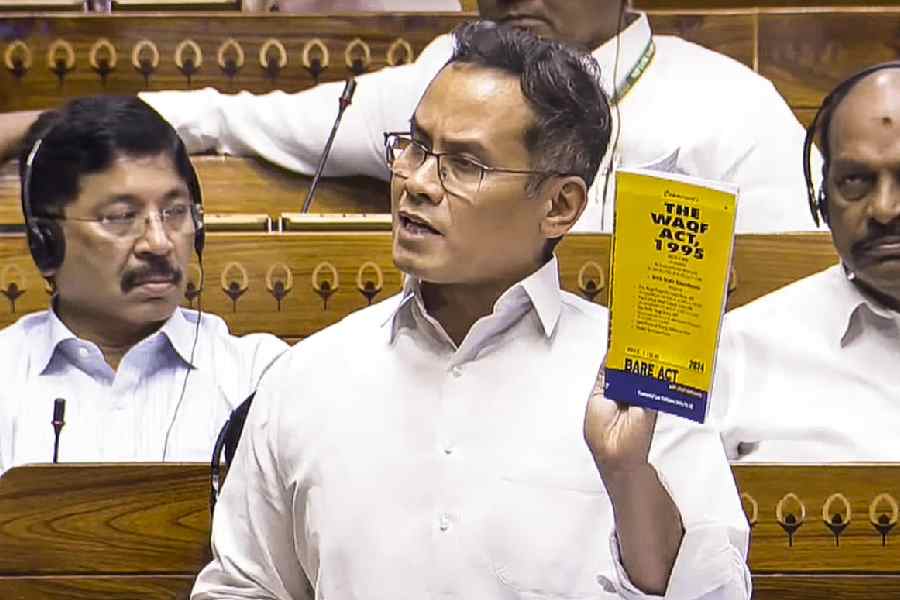The discussion on the Waqf (Amendment) Bill in the Lok Sabha on Wednesday saw the Opposition staying the course and making up for the lack of numbers to defeat the draft legislation by punching holes in its provisions and accusing the government of targeting Muslims with an eye on the community’s land.
Having decided to participate in the debate instead of walking out or disrupting proceedings, the Opposition came prepared to take on the government with facts. The appeasement allegation levelled by the BJP and its allies against the Opposition was countered with the charge that the BJP was bulldozing the bill through to further its polarising politics.
Congress MP Gaurav Gogoi led the Opposition charge by questioning several provisions of the bill and the claims made by minority affairs minister Kiren Rijiju about the “historic changes” being proposed.
Gogoi contested the claim that the bill was the result of wide consultations, terming it an attack on the constitutional structure. “The aim is to dilute the Constitution, defame minority communities, divide the Indian society and disenfranchise minority communities.”
He questioned the provision that only a person who had been practising Islam for a minimum of five years could donate towards waqf.
“Will you also ask people of other faiths to produce a certificate of how long they have been practising their faith? If not, is it not against the constitutional provision of freedom to manage religious affairs to expect Muslims to provide this kind of certification? Why are you taking away the right of people to donate towards waqf irrespective of their faith?” Gogoi said.
Gogoi and others after him called out the government on the claim that the bill was gender-friendly as it provided for two women to be included in waqf boards.
“Since the 1995 amendment, women can be members of waqf boards,” Gogoi said, adding that the new bill wasconfining their number to two per board.
Referring to the inclusion of the Unlawful Activities (Prevention) Act (UAPA) in the bill, Gogoi asked which other religious board would this law — considered draconian — be extended to and alleged that this was a bid to malign aparticular community.
Late in the night, leader of the Opposition in the Lok Sabha Rahul Gandhi posted on X: The Waqf (Amendment) Bill is a weapon aimed at marginalising Muslims and usurping their personal laws and property rights. This attack on the Constitution by the RSS, BJP and their allies is aimed at Muslims today but sets a precedent to target other communities in the future. The Congress party strongly opposes this legislation as it attacks the veryidea of India and violatesArticle 25, the Right to Freedom of Religion.”
Samajwadi Party leader Akhilesh Yadav described the bill as a veil to cover the failures of the government, likening it to demonetisation that was projected as the silver bullet to address several issues but ended up missing every target set by the Centre.
Referring to the government’s target of improving the management of waqf properties through the bill to generate more revenue, Akhilesh questioned the intent to do business by milking religion.
“Is Kumbh a business proposition for you?” he asked and demanded that the government disclose the names of the 30 people who died in the stampede at the Mahakumbh on January 29 and the identity of the 1,000 people whohe claimed were reported missing.
Trinamool Congress’s Kalyan Banerjee sought to puncture the government narrative on the bill in the Lok Sabha while Bengal chief minister Mamata Banerjee explained the party’s position in a media conference in Calcutta. “Our MPs are fighting for waqf today. The jumla party has only a one-point programme — to divide the country. They believe in a divide-and-rule policy — something that we don’t. We follow our Constitution. We should all first respect the Constitution before doing anything else,” Mamata said.
Mocking the government’s attempt to project itself as a champion of Muslims, DMK’s A. Raja said irony was dead. “A party which does not have a single Muslim MP in the House is piloting their cause!” he said.
Shiv Sena (UBT) — goaded several times by the Treasury members for “abandoning” Balasaheb Thackeray’s Hindutva politics — warned that the government could bring non-Hindus into temple trusts and endowment funds now that non-Muslims were being allowed to enter the waqf boards through the bill.
“Your intent is questionable,” Shiv Sena (UBT) member Arvind Sawant said, alleging a hidden agenda to grab land to hand them over to industrialists close to the government.











